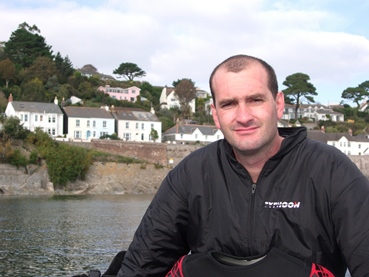September 2016
So, if those conditions change abruptly (over decades, centuries), ecosystems generally ‘change state’. And the shift in the condition of the planet is only apparent to current generations, with each successive generation forgetting the ecosystem of their parents. As evidence of this thinking, some say we’re living through the sixth great extinction NOW - not in the future, but right now - as the result of mans’ activities. Is the wolf really crying, or are we crying wolf?
The EU has been responsible for a great deal of harm (farm subsidies, ‘buying’ overseas fishing rights), but it has been progressive in applying measures to protect European seas. Over 200 marine Natura 2000 sites exist around the British Isles, covering something like 16% of our seas (alongside domestic MPA designations). We’ve been working on better protection of these sites for a decade.
Ten years ago, a local marine biologist in Falmouth contacted me about scallop dredging in the Fal and Helford Special Area of Conservation (SAC). Scallop dredging represents the worst level of respect for the environment, that devalues any protected area. But banning such a fishery any SAC was complicated because of the reticence of the then local regulator (the Cornwall Sea Fisheries Committee) to act. The Sea Fisheries Committees (SFCs) weren’t effectively constituted to protect the seas, rather they principally protected the interests of fishermen – not a bad thing at all, but immediate action to protect the environment was not a priority. In this instance, the SFC didn’t want to conflict with local scallopers, and felt national governments and licensing agencies should deal with the issue. Eventually the fisheries minister stepped in to close the fishery in 2008. This single case highlighted the unclear nature of governance of our network of European Marine Sites, and that something was needed to be done.
Unfortunately Falmouth was not an isolated case, as similar measures and campaigns to close scalloping had already been initiated in Strangford Lough, Firth of Lorn and Loch Creran SACs in Northern Ireland and Scotland. Scalloping was an increasingly attractive in the 2000’s to inshore fishers because of the lack of whitefish quota, and increasing numbers of scallops on the ground. A concurrent fuel price hike in the mid-2000’s also created a market demand to fish closer to the coast for these tasty bivalves, over some of our most beautiful and spectacular reefs, sandbanks and maerl habitats. Many sites used by scallopers were marine SACs, inevitably leading to damage.
A change in the system for dealing with such damaging fishing was needed. The result of many years of advocacy, lobbying, parliamentary enquiries and legal campaigns by NGOs has led to two progressive measures that we should feel proud of: 1) The change in the regulatory regime of fisheries at the local site level in England, and a real desire to change management of MPAs in Scottish waters; and 2) a proper risk-based approach to dealing with the most damaging fishing in our marine SACs to meet their conservation objectives. Progress since 2008 has been in the designation of more marine Special Protected Areas (SPAs), and a suite of exceptional SACs in England. In England there has been a change in the culture of inshore fisheries management, by creating Inshore Fisheries and Conservation Authorities (IFCAs) to govern and manage both fishing AND conservation of ecosystems, to replace the old Sea Fisheries Committees. IFCAs are generally ‘fit for purpose’, and have enabled a change in management better than any other regulatory body. Scotland has recently protected large areas of her inshore vulnerable Marine Protected Areas (MPAs) from scallop dredging, and prawn trawling.
Our MPAs will recover some areas of our seas, boosting productivity, returning biodiversity, providing sustainable incomes and increasing the ability of the ocean to function more naturally. Evidence from properly regulated and enforced MPAs in the Southwest and Scotland confirms this is the case.
Can we stave off the sixth mass extinction and the worst affects of climate change and ocean acidification? We genuinely may be able to do this by protecting, cherishing and loving our seas, and the people who work them. Let’s keep working with what we’ve got, and the laws that have enabled a more sustainable future. It really is for our children’s sake.
Dr Jean-Luc Solandt, Principal Specialist Marine Protected Areas
The opinions expressed in this blog are the author’s and not necessarily those of the wider Link membership




Latest Blog Posts